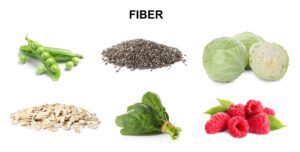
Crucial Connections: Fiber’s Impact on Gut Health and Blood Sugar Regulation
Did you know that fiber plays a crucial role in not only supporting gut health but also in maintaining stable blood sugar levels? Surprisingly, despite its importance, most Americans fall short of meeting their daily fiber requirements. Studies indicate that only about 5% of adults meet the recommended intake. With rising concerns over blood sugar levels and gut health, it’s time to delve into the connection between fiber intake and overall well-being.
Understanding Fiber Types:
1. Soluble Fiber:
-
- What it does: Soluble fiber, found in foods like oatmeal and fruits, forms a gel in the stomach, slowing down digestion and regulating sugar release into the bloodstream.
- Where to find it: Incorporate foods like beans and carrots into your diet for a steady source of soluble fiber.
- Why it’s important: Stabilizing blood sugar levels is one of the key benefits of soluble fiber.
2. Insoluble Fiber:
- What it does: While not directly impacting blood sugar, insoluble fiber aids digestion and promotes gut health.
- Where to find it: Whole grains and fruits like berries are excellent sources of insoluble fiber.
- Why it’s beneficial: Maintaining a healthy digestive system indirectly supports stable blood sugar levels.
Exploring Supplemental Fiber Options:
While getting fiber from whole foods is ideal, sometimes we need a little extra help. Let’s take a closer look at four popular supplemental fibers, including acacia, and how to seamlessly integrate them into your diet.

- Acacia Fiber:
- What it is: Derived from the sap of the Acacia senegal tree, acacia fiber is gentle on the stomach and dissolves easily.
- Benefits: Suitable for those with digestive issues, acacia fiber can be seamlessly integrated into various foods and beverages.
- Psyllium Fiber:
- What it is: Another soluble fiber option, psyllium fiber aids in regular bowel movements and relieves constipation.
- Benefits: Its gel-like substance helps maintain digestive health.
- Glucomannan:
- What it is: Derived from the konjac plant, glucomannan is highly absorbent and promotes a feeling of fullness.
- Benefits: Useful for weight management, glucomannan can be taken before meals or incorporated into dishes.
- Inulin:
- What it is: Found in plants like chicory root, inulin acts as a prebiotic, supporting beneficial gut bacteria.
- Benefits: Incorporating foods rich in inulin or using inulin powder can promote digestive health.
The Role of Fiber in Regulating Blood Sugar:
- Slows Sugar Absorption: Soluble fiber slows down sugar absorption, preventing rapid spikes in blood glucose levels.
- Improves Insulin Sensitivity: By stabilizing blood sugar, fiber enhances the body’s sensitivity to insulin.
- Enhances Satiety: Fiber-rich foods promote a feeling of fullness, reducing the likelihood of overeating and blood sugar spikes.
Tips for Including Fiber in Your Diet:
- Start the Day Right: Opt for fiber-rich breakfast options like oatmeal with berries.
- Snack Smart: Choose fiber-rich snacks such as raw vegetables or fresh fruit.
- Embrace Whole Foods: Base your meals around whole plant foods to naturally boost your fiber intake.
- Read Labels: Prioritize packaged foods with high fiber content and minimal added sugars.
- Stay Hydrated: Drink plenty of water to aid digestion and support fiber’s role in regulating blood sugar.
Incorporating fiber, whether from whole foods or supplements, is essential for supporting gut health and regulating blood sugar levels. By making conscious choices to include fiber-rich options in your diet, you can promote overall wellness and enjoy the benefits of a balanced digestive system and stable blood sugar.











